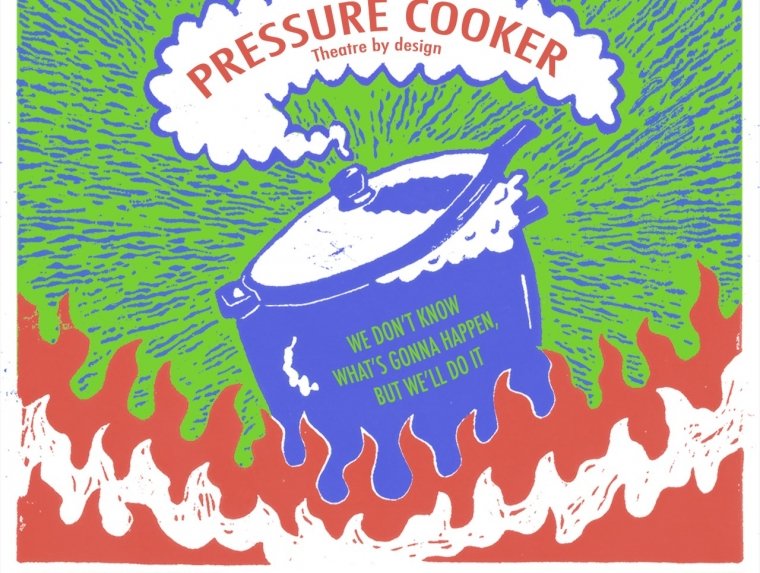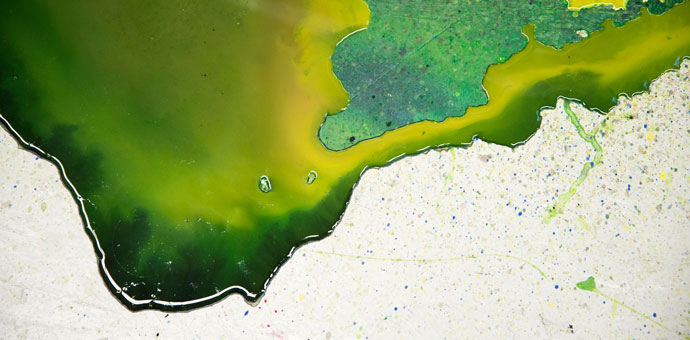Finding a free form
Marnix Vinkenborg is a theatre maker, producer, composer, director, performer and Music Theatre master student. For now, because this summer he graduates with Pressure Cooker, his finals project in which he and other makers explore whether a project can become more important than the result. Before embarking on his master course at ArtEZ, Marnix did the Composition Electronic Music bachelor at the HKU. He was already involved in theatre during that time, but he also worked on multidisciplinary projects, focusing on fashion and film, among others. So, he's been interested in multidisciplinary projects for a while.
"When I came across Music Theatre, I found an opportunity to combine various disciplines. Visuals, movement, music, sound, shapes – you can incorporate it all. Just as you can twiddle the knobs in a music studio, a theatre studio also gives you the freedom to explore." Mindful of that similarity, he embarked on his Music Theatre master course at ArtEZ – and he was not disappointed. "For me, the added value of the master course is in its range. Music theatre is not a clearly defined field: it also includes film, and musical performance. Music theatre has the potential to be everything. Using free form is very important to me."
Space for the poetry of the maker
During the first year of the Master Music Theatre, he was able to add many things to his 'toolbox': skills relating to performance, drama and writing. The aim was to learn as many new skills as possible. In the second year, he started work with all that freshly acquired knowledge and skills – with research being a constant factor. "In a Master's course, you are always exploring: you are constantly asking yourself questions. That enquiring mindset, being willing and able to question yourself, reflect and learn more about your own work, leads to makership. You become someone with a unique artistic signature."
There is scope for the poetry of the maker, for your own language.
In that process of development, he was supported by a research coach and a mentor. "As a student, you're not alone: your research coach and mentor support you – or rather 'feed' you. They ask you the right questions at the right moment." Marnix says that he also experienced a great deal of autonomy when setting up his research, particularly when it came to form. "My research is visual, for example. There is no academic test – that wouldn't be appropriate. There are no tight, strict guidelines. Instead, there is scope for the poetry of the maker, for your own language."
Six makers in one hangar
Ultimately, everything came together in his finals project, in which he and five other artists directed a multidisciplinary project called Pressure Cooker. "People from different disciplines – a sound artist, a textile designer, a researcher, a visual artist, two generalists and me as director – spent seven days shut in a hangar on the NSDM shipyard in Amsterdam. We spent a week together in that hangar at set times. That was quite intense and meant adapting every day. How do you approach the day with each other? The answer was actually very simple: with no expectations. For example, I didn't know if we would have a final performance."
Pressure Cooker was one big experiment, Marnix explains. What was the result? "The conclusion is that the experiment was a success. It taught me that I can go further. I was able to test my ideas in practice. Can you make something together with all those different disciplines? The answer is yes.” In the hangar, the makers set up a camera when things became interesting. The result is extensive documentation, which provides insight into the process: the experiment is documented in it. "We also experimented with making the video. For example, we tried to add fictional elements. But the video already contains so much drama that that didn't work... The documentation reveals what happens when you put makers in a space, shut them up together – you can see how that works. The final performance is a result of all that documentation. And that will help me in the future: I can continue developing my methods."
A new method of making
The method that Marnix wants to develop further, started with making music. "For me, the cross-over between different genres, between different instruments was very important – as was recording them in the studio and the possibilities which that offers. Just like Brian Eno wanted to combine classical music and pop, my aim is to unite composition and all the disciplines with theatre. Because that is my ultimate dream: creating a shared communication, a shared language and make work together. Being able to strengthen each other in autonomy. The idea of a hangar as an auditorium, as a huge studio where all the buttons you could wish for are available, everything the process needs – that provides endless possibilities."
That is my ultimate dream: creating a shared communication, a shared language and make work together. Being able to strengthen each other in autonomy.
Marnix wants to develop further as a theatre maker – and particularly shape his own method further. "In newspaper interviews and reviews of theatre performances, you often read how the performance was made, which method used – with a signature of the maker. I hope that Pressure Cooker will be like that: I want to continue with that method. Next year, I want to make a new interactive installation, perhaps in a white cube: invite artists to express theatrical ideas in that white cube. That could be part two, the start of a series."
What would that series look like – what can we expect? "I want to work towards a performance – but the road to that performance is also part of the work. People can see the performance, but also the documentation of the creative process, or the remnants, which are presented in an exhibition. In that way, you produce a cross-over of theatre and visual art."
From experimental musician to artist
The foundation he has laid with the Music Theatre master course will benefit him in those future plans. "When I look back at the course, learning to reflect on my own work was the most important part. I made mistakes too: for example, getting involved in projects before considering them properly, without having an idea why. Now I have developed a vision on what I want to do. I say no more often. That has brought me further both artistically and professionally."
I arrived as an experimental musician, and I am graduating as an artist. The Master's course helped me develop my makership.
The Master Music Theatre is ideal for people who are involved in developing their artistic vision, however that may be, says Marnix. "I arrived as an experimental musician, and I am graduating as an artist – I'm involved with much more than just sound. The Master's course helped me develop my makership."
More about Marnix
Find out more about Marnix and his work on Marnix’ website, and follow him on Instagram, Facebook and Soundcloud. From 9 to 18 July, Marnix was at the Over het IJ Festival in Amsterdam-Noord with PENTHOUSE PITCH: a psychological seminar, with every convenience. Watch the Pressure Cooker video.

